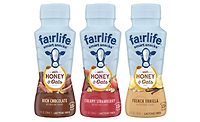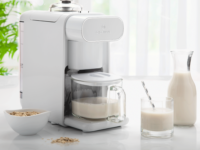Substitutions expand non-dairy options
Almond milk battles soymilk for top dairy alternative spot








In 1999, the U.S. Food and Drug Administration (FDA) approved a health claim allowing soymilk manufacturers to state that consuming 25 grams of soy protein in a diet that is low in saturated fat and cholesterol can reduce the risk of coronary heart disease, says Virginia Lee, senior research analyst at Chicago-based Euromonitor International. This claim boosted the popularity of soymilk, and it continues to be the most popular dairy alternative beverage today, she says. However, the research firm estimates that sales of soymilk declined 5.8 percent from $981 million in 2009 to $924 million in 2010, and another 8.5 percent in 2010 reaching $846 million in 2011.
“Soymilk’s decline is due to consumer migration from soymilk to other dairy alternatives such as almond milk and coconut milk due to taste, health concerns and calories,” Lee says. “Many U.S. consumers have been switching from soymilk to almond milk because they consider almond milk to be better tasting than soymilk. Almond milk is also gaining fans because it contains fewer calories than soymilk.”
Although almond milks have been available in health food stores for many years, they’ve only recently emerged in the mainstream market, according to Innova Market Insights, Duiven, the Netherlands. The United States led this trend with nearly one-fifth of dairy alternative drink launches in 2010 recorded by Innova Market Insights being almond milk or almond milk blends.
This spring, Tree of Life, based in St. Augustine, Fla., launched its Almond Beverage line. The dairy alternative includes vitamins A, D and E as well as calcium, iron and protein. It is available in Chocolate, Vanilla, Original, Unsweetened Vanilla and Unsweetened Original flavors.
Broomfield, Colo.-based WhiteWave Foods, which offers the Silk soymilk line that continues to lead the dairy alternative category in sales and market share, launched Silk Pure Almond in 2010. This summer, the product was named to Chicago-based SymphonyIRI’s Top 20 New Product Pacesetters for 2010. To earn the title of New Product Pacesetter, a new product or line extension must reach at least $7.5 million in year-one sales across food, drug and mass channels, excluding Walmart, complete a full year of sales and have 30 percent actual cash value weighted distribution, the market research company says. Additionally, Silk Pure Almond ranked No. 11 on SymphonyIRI’s list of the Top 20 best-selling products of 2010.
Coconut concoctions
This year, WhiteWave Foods once again expanded its Silk brand portfolio with a coconut milk offering.
“Coconut milk is on the rise, benefiting from greater consumer awareness of coconut water as a beneficial sports drink substitute,” Euromonitor’s Lee says.
Silk Pure Coconut does not contain dairy, lactose or cholesterol and is a good source of vitamins D and B12, the company says. The product is available in Original and Vanilla flavors with 80 and 90 calories in each serving, respectively.
“Consumers continue to seek plant-based beverages,” said Craig Shiesley, vice president of Silk, in a statement. “At the same time, they are becoming more interested in coconut-based products, so we brought those two trends together. Silk Pure Coconut gives consumers another plant-based option for milk that offers great taste combined with the calcium they’re looking for.”
In September, the brand increased the calcium level in its natural refrigerated soymilk products to 50 percent more than typical dairy milk, which is consistent with its Pure Almond and Pure Coconut products, the company says.
The company also is intent upon growing its non-dairy lineup. “In January 2012, Silk will introduce an entirely new product that will continue the trend of providing plant-based, nutrient-rich non-dairy beverage options,” says Sara Loveday, spokesperson for WhiteWave Foods.
Sacramento, Calif.-based Blue Diamond Growers offers a flagship line of Almond Breeze almond milks, which ranked No. 2 on SymphonyIRI’s list of top refrigerated kefir/milk substitutes/soymilk brands in U.S. supermarkets, drug stores, gas and convenience stores and mass merchandise outlets, excluding Walmart, for the 52 weeks ending Sept. 4.
This September, the company expanded its portfolio with the launch of a new line of dairy alternative blends. Blue Diamond Breeze Almondmilk Coconutmilk Blend is available in Almond Coconut Original, Almond Coconut Original Unsweetened, Almond Coconut Vanilla and Almond Coconut Vanilla Unsweetened varieties.
Keeping up with kefir
While soymilk and almond milk are the top dairy alternative contenders, Lifeway Foods’ Lifeway Kefir brand landed the No. 6 spot on SymphonyIRI’s list of top refrigerated kefir/milk substitutes/soymilk brands in U.S. supermarkets, drug stores, gas and convenience stores and mass merchandise outlets, excluding Walmart, for the 52 weeks ending Sept. 4.
In the second quarter of 2011, Lifeway Foods’ gross sales increased 28 percent to $19.9 million compared to $15.5 million for the second quarter of 2010, the company says. It attributes its growth to an increase in consumer awareness of the benefits of kefir; increased sales of its Kefir and ProBugs Organic Kefir for kids brands; and the successful introduction of new product lines such as Bio Kefir. Similarly, the popularity of its beverages has led to expanded distribution. In the third quarter of 2010, the company added Costco, BJ’s Wholesale Club and Big Y Foods chain stores to its distribution channel.
“Our increased distribution is a direct result of the growing popularity of kefir and the many health benefits of its probiotics,” said Julie Smolyansky, chief executive officer of Lifeway Foods, in a statement.
This year, the company celebrated its 25th anniversary with the launch of Lifeway Kefir Birthday Cake-flavored smoothie. The low-fat beverage features probiotics and is packaged in special 25th anniversary packaging.
The company also released Green Kefir with Phytoboost, which is a fruit-flavored cultured milk smoothie. Green Kefir with Phytoboost combines the probiotics of kefir with 80 mg. of plant-based polyphenols, the oxygen radical absorbance capacity (ORAC) equivalent of a full serving of vegetables in each bottle, to neutralize free radicals and support the immune system, Lifeway Foods says. It also provides 100 percent of the U.S. Department of Agriculture (USDA) recommended daily value (RDV) of vitamin C, 20 percent of the USDA RDV of vitamin A and 30 percent of the USDA RDV of vitamin E. The beverage is available in Kiwi Passion Fruit and Pomegranate Acai Blueberry flavors.
Innovative sources
While soymilk, almond milk, coconut milk and kefir continue to be in demand, other dairy alternatives are cropping up.
Hope, Minn.-based Sunrich Naturals, which offers a line of soymilk, recently launched a new dairy alternative line called SōL. Made from sunflower kernels, SōL contains antioxidants, vitamins and minerals to promote heart and brain health, strengthen bones and teeth, and promote younger-looking skin, the company says. It also includes folic acid, which is beneficial for prenatal health. Each 8-ounce serving provides 50 percent of the recommended daily allowance for vitamin E, 60 percent for phosphorus, 30 percent for calcium, 25 percent for vitamin D and 20 percent for folic acid. The beverage is available in Unsweetened, Original and Vanilla flavors and comes in shelf-stable aseptic 32-ounce Tetra Pak containers.
According to Packaged Facts’ 2010 Culinary Trend Mapping Report, hemp milk has been on the market for a few years, but it’s just now getting into the mainstream market. Manitoba Harvest, based in Canada, has fueled the growth of hemp milk beverages, the report states. It introduced Hemp Bliss in April 2007, and within the last five years, its sales have grown more than 500 percent, it adds.
Recently, Pacific Natural Foods, Tualatin, Ore., launched three new varieties of hemp milk: Unsweetened Original, Unsweetened Vanilla and Chocolate. Each features a natural source of omega-3s and 6s, calcium, protein, vitamins and amino acids, the company says.
Health halo
According to the Innovation Center for U.S. Dairy, consumers are increasingly seeking better-for-you dairy drinks, which is beneficial for the dairy beverage segment because it carries a health halo. But consumers aren’t that easy to please, it notes. They want it all: low calories and good taste, the Innovation Center for U.S. Dairy says. And when you bring kids into the equation, nutrition carries even more meaning.
This year, Dean Foods launched TruMoo, a better-for-you chocolate milk made without high fructose corn syrup. The brand contains 15 to 20 percent less sugar than typical flavored milks and just 40 more calories than unflavored white milk in each serving, the company says. TruMoo is sold as 1 percent low-fat milk in retail stores, and fat-free in schools. Depending on regional and retailer variations, the beverage also can be available in Strawberry, Vanilla and Coffee flavors in gallons, half gallons, quarts and single-serve bottles. In schools and foodservice settings, it’s available in half-pint containers. Fat-free TruMoo milk contains 130 calories a serving with 10 grams of added sugar, compared to previous chocolate milks made with as many as 180 calories and 16 grams of added sugar, the company says.
After launching successfully in select retail and school locations in the Northeast and Pacific Coast regions, almost all of the flavored milk across Dean Foods’ family of regional brands is converting to TruMoo, making it one of the largest milk brands in the country by sales and volume, the company says.
Although consumers might be used to seeing dairy drinks and dairy alternatives packaged in glass jugs, plastic bottles and paper cartons, aluminum bottles might be a new sight for them. Earlier this year, Buffalo, N.Y.-based Upstate Niagara Cooperative launched Crave chocolate milk in aluminum bottles nationwide. In addition to keeping the product cold, the bottles feature a twist-off cap that allows consumers to take the beverage on-the-go. The aluminum packaging also offers a sustainable attribute because aluminum is 100 percent recyclable. In addition, Crave’s pasteurization process allows it to be shelf stable, the company says.
Also capitalizing on consumers’ interest in on-the-go beverages is Denver-based Atkins Nutritionals Inc. Containing 10 grams of protein, 3 grams of net carbs or less and zero grams of sugar, Atkins Day Break Shakes feature resealable twist-off caps for consumers on-the-go. Atkins Nutritionals research showed that 60 percent of consumers drink breakfast shakes on-the-go, which led the company to institute the resealable closures to its bottles, it says. The shakes are available in Wild Berry, Creamy Chocolate and Strawberry Banana flavors and contain on average 20 grams less net carbs and 2 grams more fiber than its competitors, the company says.
Odwalla, a subsidiary of The Coca-Cola Co., offers a line of protein-fortified beverages in multiple varieties. Its Odwalla Protein Monster brand landed the No. 9 spot on SymphonyIRI’s list of top refrigerated kefir/milk substitutes/soymilk brands in U.S. supermarkets, drug stores, gas and convenience stores and mass merchandise outlets, excluding Walmart, for the 52 weeks ending Sept. 4. Its Odwalla Super Protein brand ranked No. 15 on the list. This year, the company introduced Odwalla Super Protein Mango smoothie to the line. Each 12-ounce bottle contains 20 grams of soy protein and provides 50 percent of the RDV of calcium and 150 percent of the RDV of vitamins B12 and B6.
“Mango-flavored beverages are becoming increasingly popular, yet we noticed a gap in the non-dairy protein category,” said Irma Shrivastava, vice president of marketing at Odwalla, in a statement. “By providing 20 grams of soy protein and a creamy swirl of mango flavor in every bottle, Super Protein Mango is a fresh on-the-go beverage for health-conscious consumers who don’t want to compromise taste.” BI
Looking for a reprint of this article?
From high-res PDFs to custom plaques, order your copy today!










